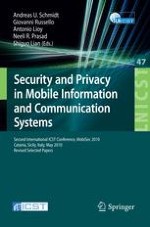2010 | Book
Security and Privacy in Mobile Information and Communication Systems
Second International ICST Conference, MobiSec 2010, Catania, Sicily, Italy, May 27-28, 2010, Revised Selected Papers
Editors: Andreas U. Schmidt, Giovanni Russello, Antonio Lioy, Neeli R. Prasad, Shiguo Lian
Publisher: Springer Berlin Heidelberg
Book Series : Lecture Notes of the Institute for Computer Sciences, Social Informatics and Telecommunications Engineering
